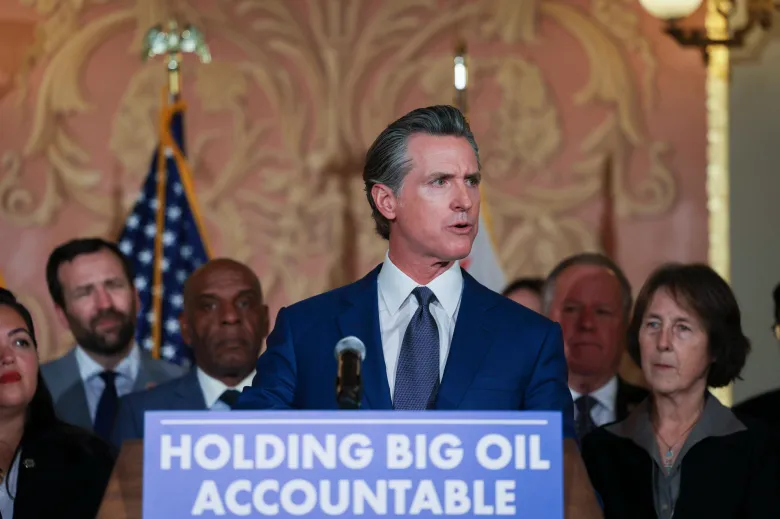New law will give greater powers to California’s unelected energy commission to regulate fuel storage and the timing of maintenance.
Sacramento – Governor Gavin Newsom signed AB 1 this week after the bill passed the Assembly by a vote of 41 to 16, with 22 members abstaining. The bill, which is supposed to prevent price spikes for gasoline but was opposed by both the energy industry and labor groups, would give the California Energy Commission (CEC) new powers to regulate how much fuel is stored in refineries and when they can conduct maintenance.
Newsom, who called a special session of the legislature to enact this proposal, said that the bill would not be “the final word on gas prices in the State of California,” referring to the regulations the CEC can now promulgate. The governor also referred to the “humility” it takes to properly set gas prices through bureaucratic procedures.
The law is needed, Newsom argues, because supply shocks and ill-timed maintenance on refineries cause spikes in prices that increase oil company profits.
The commission, all five members of which are Newsom appointees, will now have greater power to dictate the timing of refinery maintenance and how much fuel can be stored at a given place or time.
Both the energy industry and labor groups opposed the measure, with Chevron sending a detailed letter to state legislators explaining how more government interference will cause gas prices to rise even more.
“Across the three dozen states in which we work, the California government remains unique in its focus on marketplace interference with negative effects on consumers resulting in the highest U.S. gasoline prices,” the letter reads. “California has investigated the industry numerous times for price gouging and come up with no evidence or charges.”
The letter goes on to offer a lesson in basic economics regarding supply and demand, noting that when demand outstrips supply prices rise. Adding mandatory inventory thresholds to the mix will only keep oil out of the market to be held in reserve, further restricting supply and increasing price, it says.
The letter further notes that spikes in price do not directly translate to increased profits since refineries often operate at a loss depending on demand.
The letter’s author, Chevron President of Downstream, Midstream, and Chemicals Andy Walz, also warned that his company may not be able to do business in California under increased regulations. Newsom characterized these arguments as “lying to you” during the signing ceremony.
Labor groups also opposed the bill out of concern that state officials without any refinery experience would dictate how and when workers conduct unplanned maintenance. They worry this could be dangerous for workers, and rallied some Democrats to vote against the bill or at least abstain. AB 1 drew bipartisan opposition in both houses of the legislature, passing the state Senate by a vote of 23-9 with 8 abstentions.
The governors of neighboring Arizona and Nevada have also urged Newsom to abandon the measure since it could restrict the supply of gasoline that California refineries provide to their states as well. Arizona Governor Katie Hobbs, a Democrat, and Nevada Governor Joe Lombardo, a Republican, cosigned their own letter to Newsom that pointed out the CEC’s own report warns of artificial shortages in downstream markets, which would include both of their states.
California’s oil industry is currently the sixth largest in the US, producing over 400,000 barrels per day. Fifteen refineries remain active, down from a height of 38 in the mid-20th Century, when California produced nearly 40 percent of American oil.


